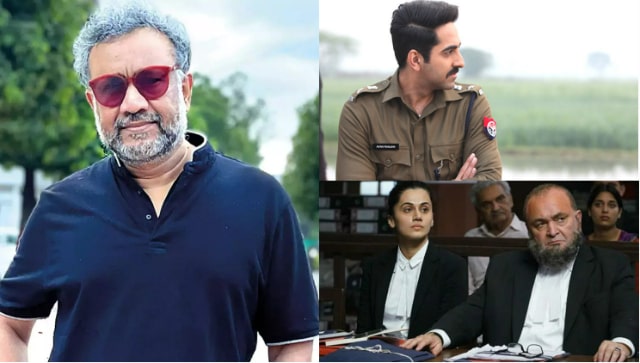I’ve known Anubhav Sinha from the time he made his first film Tum Bin way back in 2001. The film introducing a bunch of bright newcomers gave us no clue of what lay ahead. But that was later. Tum Bin, a love quadrangle featuring Priyanshu Chatterjee , Sandali Sinha , Himanshu Malik and Raqesh Bapat , was a minor success and Anubhav was emboldened to make more celluloid candyfloss like Aap Ko Pehle Bhi Kahin Dekha Hai, a desi Father Of The Bride where Om Puri played the over-protective father. The most interesting part of this hazily romantic film was the title: Aapko Pehle Bhi Khain Dekha Hai was a hit song from a Dharmendra - Hema Malini ’s first film together Tum Haseen Main Jawaan. Anubhav’s career slid from inoffensive romanticism to aggressive action in Cash, Tathastu and most importantly Ra.One . Each worse than the other.
Then, something happened to Anubhav Sinha. From being the creator of crunchy confection he suddenly metamorphosed into a filmmaker of compelling conviction. I have never seen any filmmaker transform from trivia to classic so suddenly. It was a miracle, no less. Since Mulk , I have spoken to Anubhav many times about his transformative leap, an overnight alchemy comparable, in cosmetic terms, to Rekha’s change from oily duskiness to sultry stunner. How did it happen? Says Anubhav, “I don’t know! This OTHER filmmaker that you keep asking me about was there within me. He didn’t make a sudden appearance in my life. I always had these stories like Mulk, Article 15, Thappad and Anek within me. I don’t disown the earlier films I made before Mulk. They are a part of me. They are a part of my journey as a filmmaker. If I hadn’t made Tum Bin and Ra.One perhaps I wouldn’t have arrived at Anek and my forthcoming Bheed. All the earlier films were part of the process of my growth. I regret nothing. I am glad I made those earlier films.” Anubhav can say what he likes, but it was very hard to believe that a filmmaker whose earlier credits include stuff like Tum Bin and the Shah Rukh Khan helmed superhero Ra.One, actually created Mulk, a modern political masterpiece which attempts very successfully to humanize a community that has been demonized by some negative elements. And yet Mulk doesn’t take sides, doesn’t make the Indian Muslim community a portrait of injured innocence. What it does do—and full-marks to Anubhav Sinha for writing a script that doesn’t bend backwards to humanize the community under siege—is to lay bare the layers of deception that mars a truly fruitful dialogue between sane rational elements in both the Hindu and Muslim community. Mulk is a work that won’t settle for the status quo. It forces us to think and reconsider our value system But my favourite Anubhav Sinha film is Article 15 one of India’s finest political dramas on a par with Shyam Benegal ’s Nishant and Govind Nihalani ’s Akrosh. It is hard to believe the level of political credibility and social conscientiousness Anubhav Sinha’s cinema acquired after Mulk. Article 15 went even further than Mulk in search of the truth that lies underneath the veneer of fairness and justice for all. Sinha’s stunning film says a lot of things we don’t really want to hear about social discrimination in the cow belt areas. Article 15 takes us to a dusty little town in Uttar Pradesh where a sophisticated liberal cop (Ayushmann Khurrana) joins duty and immediately stumbles onto a horrific caste crime whereby two girls are gang-raped and hung from a tree. A third girl is missing. Sinha imparts to the search for the girl a ‘thriller’ element that in no way over-dramatizes the film’s incessantly grim mood. The director has no songs even in the background because there is nothing to sing about. Not now. Not here. In telling this hideously messy tale, Sinha makes no effort to spare us the details. The caste system and gender discrimination are so deeply embedded in the social fabric of rural India that men, or at least a section of them, feel entitled to teach women a lesson if they don’t comply. Article 15 is a film that must be seen by every Indian. Not because it tells us something new. But because what it tells us ought to become irrelevant to our society by now. But oppression, like the films on oppression, has a knack of coming back when we feel it is gone. With Mulk and Article 15 Anubhav has acquired the formidable reputation of being a filmmaker who uses his voice to address issues that go beyond cinema, and yet he remains resolutely cinematic in his vision. Subhash K Jha is a Patna-based film critic who has been writing about Bollywood for long enough to know the industry inside out. He tweets at @SubhashK_Jha. Read all the Latest News , Trending News , Cricket News , Bollywood News , India News and Entertainment News here. Follow us on Facebook, Twitter and Instagram.


)
)
)
)
)
)
)
)
)



